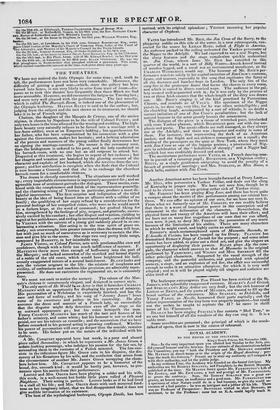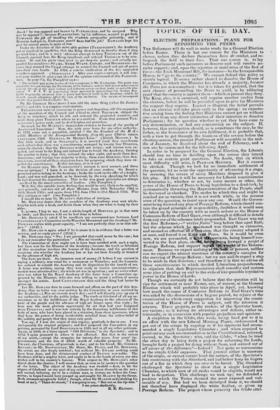ROYAL ACADEMY.
TO THE EDITOR OF THE SPECTATOR.
King's Bench Prison, 8th November 1836„
SIR—In the very important space you allotted last Sunday to the Arts, you did yourself honour and the Arts too. In your extracts of the examinations before the Committee, you say "both the President and Mr. HOWARD contradict Mr. HAYDON in direct terms as to the origin of the Royal Academy : per- haps the truth lies between." Permit me to state my authority an compare it with their authority, and let the public judge. In my evidence I say, the Academy was founded on the basest intrigue. My authorities are Sir ROBERT STRANGE, and Pamphlets in the British Museum, published at the time. Sir MARTIN SHEE quotes Mr. FARRINGTON'S Life of Sir Jost-Ina, and Mr. EDWARDS, a tool and protege of Mr. FanniNcTow, to prove Me contrary. Now, Sir ROBERT STRANGE Was a great en- graver, an honest man, an inoffensive and a good man. Mr. FARRINGTON was a specimen of what Nature could do in a bad humour, to give the world as- surance of a bad painter : he was an intriguer and a jobber all his life. There was no Professor of Perspective : REYNOLDS wished to elect BONOSII, an architect, to be the Professor: none but an ILA. could legally teach it.
rtnrk ! he time opposed and beaten by FA ita.ssierosr, and he resigned Why was he opposed ?—heraUSe FA RRINGTON. 'ehy Lig influence, wanted to get little EDWA RDS the job of teaching the sPeelrnes perspective prirately ; and if BONO ni had got in, Eow& ens would hose lost the job/ Mow ens kept his pt for several years, in spite of law.
limier the direction of this naise..ahle painter (Fmtareceron), the Academy got RID involved in squabbles, thfa the King thleatersed to dissolve them if they pestered him ; and in a nio-t 'atfanions attempt to keep Taestia st (Gut of the Courted, against law, the King interfered, and ordered Titesti A 7■1 to he rein- stated. •fle and his party ':fen tried to get deep nic power ; ited :whinny ails. peniltal five members—So ANS. YENN,WY ATT. COPLIIV, and Boo RGEOIS—be• rilll‘e they resisted the Mega] attempt to centre' the Council and get all power into thgir own hands. In 1804. a coneise vindieation of the Ine suspended Ii embers appeared. STOCK DA I.E. ) After your copimot extract, it will intr. test your readers to, give se itlea of the opinion entertained of this FARRING-
.
TON. In page Pl.3, the Pamphlet sa)s- is • rip actlwed anti active leader of this conspiracy is Mr. Farrington. The party was orizinally forrnisl during the Presidency or Sir Joshua ;unit ii . lirst si2lial achievement ens an ally rk a the most violent „,..1 indecent nature on that trot), re-peelable
cliii-
I • • • • it was Miring those memorable proceedings, Sir Joshua Rey• nohls re pratedly otwerved that it party had formed itself in the Academy, which, he eritild ultimately ce'rrt the ruin if the Ms itutioa. 'Ike coarse of suusequent evialts has moved his foresight?' Ste.
By Sir GEORGE BEA r MONT I Wag HIM the same thing (what Sir JOSHUA
said awl this is a singular conhi mation.
FA RRINGTON went on increasing in power and despotism, till this suspension IS the members of the Council and refusal to admit TRESHA SI, obliged the Kieg to interfere; which he did, and restored the suspended !members. and nettle them place TRESHANI where he was entitled. From that moment FAR. RINCTON'S power sank, and be died helpless and powerless. So much for Sir MARTIN'S immaculate evidence in favour of the purity of Acat:emical foundation ! Now, Sir, with your leave, for my other atithotity. In 1771 came out a pamphlet, entitled " On the Conduct of the B. A.s while Members of the Incorporated Society, from the year 1760 to THEIR X ruLSION, 1769. DIX WELL. St Martin's Lane." (British Museum.) In this little work, and in STRA-NGE'S, it is asserted (and they corroborate each other) that there was a constituency. managed by twenty four Directors, annually elected ; that the Directors would not resign ; and sixteen were ex- it( lied, and went to the King and induced him to found the Academy, limiting the number to forty ; that they reduced the other elght, and made them Aca- demicians; and having four majority in fiatv, these same Directors, then Aca- demicians, carried all their obnoxious laws. for proposing which they were ex- pelled the constituency. Is this intrigue, or is it not?
Sir MARTIN says Mr. FARRINGTON'S actionnt is most correct, and there was no intrigue ! I leave it to the decision of your readers. Sir Jostrua pr ttttt ised not to belong to the Academy ; broke his weed oothe offer of a knight- hood ; and was well punished, as he deserved, by the very Academy for which he had deserted the constituency. This is the way great principles are always acrifieed by the moral cowardice of leaders. (See Pamphlet.)
W01, Sir, this amiable junta, finding they would be very likely to he expelled, met privately, and tore out all their Minutes. From 19th November 1764 to 11th March 1765; and again, from 17th June 1765 to 21st March 1766. TVas this intrigue or not? (See Pamphlet.)
I should like to hear Sit MARTIN'S definition of intrigue.
Mr. HOWARD denies that the members of the Academy ever sent whole. lengths with only a head, and finish them when they see what is hung by their
aide'., 'answer, I beg to say, I saw a whole-length of HOPPNER go in that state in 1809: and HOPPNER told me he had done so before.
Mr. HOWARD IS asked if he recollects any correspondence between Lord CASTLEREAGH'S Committee on theWaterloo Monument and the Academy? Mr. I own RD replies with great sagacity, " I am not perfectly clear as to that sub- ject." (2142.) Mr. HOWARD is again asked if he is aware it is in evidence that a letter was itten, and no reply given? (2152.) Mr. flown RD says, "No; 1 am persuaded that could never be the case ; but I do not remember the particulars." (Non ad ricordo.) The Committee of Arts ought not to have been satisfied with such a reply, but have sent for the Minutes of the Academy ; because the truth or falsehood of this accusation involves the honour of the Academy, and the question of suspicion also whether the Academy has or has not been friendly or inimical to the advance of high art. The Lets are these. An immense sum of money (I believe I am correct in saying a million), was voted for a monument to Waterloo; and the Commit- tee ordered to consult the Academy and its disposition for the benefit of art. A letter was written, saying they were ready to receive communications; models were advertised for ; the whole art was in agitation ; and no notice what- ever was taken by the Royal Academy of this letter from a Cnmmittee ap- pended by the Minister, who also was willing to spend a million of money amongst the artists. Lord CASTLEREAGH then said the thing had better be given up.
Let Mr. Howaan dare to come forward and affirm on the mut of this Aca- demy, that no letter was ever written by the Committee or ever received by the Aeadem7—(Non mi rieordo won't do)—and I will directly give up one of my authorities, and let the public judge. The truth or falsehocel of all my ac- cusations as to the indifference of the Royal Academy to the advance of the taste of the people and the advance of high art hinges upon this reply ; for lit-re was the most glorious opportunity for art that had ever happened since PERICLES ; and It was lost entirely by the disgusting indifference of this body of men, who have been placed in a situation, from sheer ignorance, where they have the power of doing incalculable mischief from the artless belief of the nobility and people that they mean only good.
You say, if I was the origin of this inquiry, gratitude is due to me. I was indisputably the original proposer; and first proposed the Committee in any petition, presented by Lord BROUGHAM in 182;3, and in all my other petitions. Again, in 1830, ma letter signed "Old Dilettante," in the Spectator; and in 1V:32, I again proposed it, where it was effectual. But that is the extent of my merit,—except the struggles for twenty-five years, four years' im- prisonments, and the loss of 4000/. worth of valuable property. To Mr. EWA AT, the Chairman, all gratitude is due; and to his friend, Mr. GEORGE RENNIE ; to Mr. BROTHERTON, Mr. HOPE, Mr. PUSEY, and Dr. BOWRING, the artists ate also deeply indebted ; but without Mr. EWART nothing could have been Anne, and the disinterested conduct of RENNIE was noble. The Evidence will he a mighty lever, and ought to be in the hands of every one who wishes well to his country's honour. With respect to Mr. HOWA RD'S other denial about the charter, 1 will answer that, as soon as he answet s the question of the letter. The object of the Academy was twofold —fist, to fix the stigma of falsehood on any part of my evidence to throw discredit on the rest ; and second, believing me to he a violent man, to irritate me before the Com- mittee, in hopes I would have jumped up and caught Sir MARTIN by the throat. Both attempts egregiously failed ; though, when Sir MARTIN said (shaking his band at me), "There he stands," I was going to say, "But not on his tip-toes." I am yours obediently.?
B. H. HAYDON.



























 Previous page
Previous page